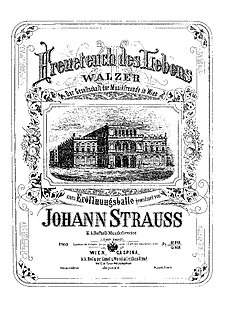
Johann Strauss II, also known as Johann Strauss Jr., the Younger, the Son, was an Austrian composer of light music, particularly dance music and operettas. He composed over 500 waltzes, polkas, quadrilles, and other types of dance music, as well as several operettas and a ballet. In his lifetime, he was known as "The Waltz King", and was largely responsible for the popularity of the waltz in Vienna during the 19th century. Some of Johann Strauss's most famous works include "The Blue Danube", "Kaiser-Walzer", "Tales from the Vienna Woods", "Frühlingsstimmen", and the "Tritsch-Tratsch-Polka". Among his operettas, Die Fledermaus and Der Zigeunerbaron are the best known.

Johann Strauss I was an Austrian Romantic composer. He was famous for his waltzes, and he popularized them alongside Joseph Lanner, thereby setting the foundations for his sons—Johann, Josef and Eduard—to carry on his musical dynasty. He is best known for his composition of the Radetzky March.

Chlodwig Carl Viktor, Prince of Hohenlohe-Schillingsfürst, Prince of Ratibor and Corvey, usually referred to as the Prince of Hohenlohe, was a German statesman, who served as Chancellor of Germany and Prime Minister of Prussia from 1894 to 1900. Prior to his appointment as Chancellor, he had served in a number of other positions, including as Prime Minister of Bavaria (1866–1870), German Ambassador to Paris (1873–1880), Foreign Secretary (1880) and Imperial Lieutenant of Alsace-Lorraine (1885–1894). He was regarded as one of the most prominent liberal politicians of his time in Germany.

Josef Strauss was an Austrian composer.

"The Blue Danube" is the common English title of "An der schönen, blauen Donau", Op. 314, a waltz by the Austrian composer Johann Strauss II, composed in 1866. Originally performed on 15 February 1867 at a concert of the Wiener Männergesangsverein, it has been one of the most consistently popular pieces of music in the classical repertoire. Its initial performance was considered only a mild success, however, and Strauss is reputed to have said, "The devil take the waltz, my only regret is for the coda—I wish that had been a success!"
Künstlerleben, Op. 316 is a waltz written by Johann Strauss II in 1867, following closely on the success of the popular "The Blue Danube". Austria was severely shaken the previous year 1866 by the crushing defeat that the Austrian army suffered in the Battle of Königgrätz and many of the year's festivities and balls were cancelled as the prevalent depressing mood affected most of Vienna's populace.

Wiener Blut Op. 354 is a waltz by Johann Strauss II first performed by the composer on 22 April 1873. The new dedication waltz was to celebrate the wedding of the Emperor Franz Joseph I's daughter Archduchess Gisela Louise Maria and Prince Leopold of Bavaria. However, the waltz was also chiefly noted by Strauss' biographers as the début of Strauss with the Vienna Philharmonic Orchestra where for many years, the Philharmonic had dismissed any association with the 'Waltz King' as it had not wished to be associated with mere 'light' or 'pops' music. The festival ball celebrating the event was held at the Musikverein Hall which is the venue for the present day Neujahrskonzert.
Neu Wien , opus 342, is a waltz written by Johann Strauss II in 1870 and dedicated to Nicolaus Dumba (1830-1900), who was a fervent patron of Arts and was the Chairman of the Wiener Männergesang-Verein and Vice-President of the Gesellschaft der Musikfreunde in Wien.

Wiener Blut is an operetta named after the "Wiener Blut" waltz, supposedly with music by the composer Johann Strauss the Younger, who did not live to witness the première. Such was the popularity of the original "Wiener Blut" Op. 354 waltz until the time of the composer's death that his work would be chosen as the name of the operetta with libretto by Victor Léon and Leo Stein set around the Vienna Congress of 1814 to 1815.
"Tales from the Vienna Woods" is a waltz by Johann Strauss II.

Robert Elisabeth Stolz was an Austrian songwriter and conductor as well as a composer of operettas and film music.

Prince Alexander Leopold Franz Emmerich of Hohenlohe-Waldenburg-Schillingsfürst was a German priest and reputed miracle-worker.

Konrad Maria Eusebius Prinz zu Hohenlohe-Waldenburg-Schillingsfürst was an Austrian aristocrat and statesman. He briefly served as Prime Minister of Austria (Cisleithania) in Austria-Hungary in 1906.

Freuet euch des Lebens, Op. 340, is a Viennese waltz composed by Johann Strauss II. It was written for the Vienna Musikverein, and premiered at the new Musikverein building in Vienna in 1870.

Gottfried Prinz zu Hohenlohe-Waldenburg-Schillingfürst, Ratibor und Corvey, was an Austro-Hungarian army officer and diplomat during World War I.

Victor I, Duke of Ratibor, Prince of Corvey, Prince of Hohenlohe-Schillingsfürst was a member of House of Hohenlohe-Schillingsfürst and later Duke of the Silesian duchy of Ratibor and Prince of Corvey.

Victor II, Duke of Ratibor, Prince of Corvey, Prince of Hohenlohe-Schillingsfürst was a member of House of Hohenlohe-Schillingsfürst and Duke of the Silesian duchy of Ratibor.

Konstantin Viktor Ernst Emil Karl Alexander Friedrich Prinz zu Hohenlohe-Schillingsfürst was a k.u.k. First Obersthofmeister and General of the Cavalry of Austria-Hungary.

















